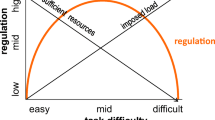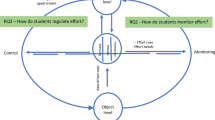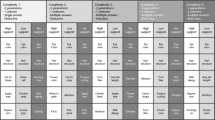Abstract
The main goals of this paper are to exemplify and further elaborate on the theoretical connections between cognitive load and self-regulated learning. In an effort to achieve this, we integrate the concepts of self-control and self-management within the effort monitoring and regulation (EMR) framework laid out by de Bruin et al. (Educational Psychology Review this issue). More specifically, we argue that (1) cognitive load results from how the instruction is processed and not just from how it is designed (cf. self-management effect). (2) How instruction is processed by students (also) depends on their skill and will to self-control. For instance, high self-control may reflect compensatory processing of poorer instructional designs so that these designs may not lead to higher extraneous cognitive load. As soon as students’ willingness to self-control declines (e.g., with increasing study durations or previous demanding tasks), there is a closer link between (poorer) instructional designs and (higher) extraneous cognitive load in self-regulated learning tasks. Combining (1) and (2), we consider cognitive load to be influenced by self-control; (self-)control, in turn, is one central process of the monitoring-control cycle that characterizes self-regulated learning. We support these theoretical arguments by referring to empirical research in the domain of learning with multiple representations—with a particular focus on learning with and without seductive details during extended study episodes. We conclude with suggestions for further research.




Similar content being viewed by others
References
Alexander, P. A. (2019). The art (and science) of seduction: Why, when, and for whom seductive details matter. Applied Cognitive Psychology, 33(1), 142–148.
Baumeister, R. F., Bratslavsky, E., Muraven, M., & Tice, D. M. (1998). Ego depletion: Is the active self a limited resource? Journal of Personality and Social Psychology, 74(5), 1252–1265.
Baumeister, R. F., Vohs, K. D., & Tice, D. M. (2007). The strength model of self-control. Current Directions in Psychological Science, 16(6), 351–355.
Bender, L., Renkl, A., & Eitel, A. (submitted). Seductive details do their damage also in depleting study situations – when the details are perceived as relevant.
Bjork, R. A., Dunlosky, J., & Kornell, N. (2013). Self-regulated learning: Beliefs, techniques, and illusions. Annual Review of Psychology, 64(1), 417–444.
Boekaerts, M. (2017). Cognitive load and self-regulation: Attempts to build a bridge. Learning and Instruction, 51, 90–97.
de Bruin, A. B. H., Roelle, J., Baars, M., & EFG-MRE. (this issue). Synthesizing cognitive load and self-regulation theory: A theoretical framework and research agenda. Educational Psychology Review.
Carver, C. S., & Scheier, M. F. (2001). On the self-regulation of behavior. Cambridge University Press.
Cierniak, G., Scheiter, K., & Gerjets, P. (2009). Explaining the split-attention effect: Is the reduction of extraneous cognitive load accompanied by an increase in germane cognitive load? Computers in Human Behavior, 25(2), 315–324.
Corno, L., & Kanfer, R. (1993). The role of volition in learning and performance. Review of Research in Education, 19(1), 301–341.
Eitel, A. (2016). How repeated studying and testing affects multimedia learning: Evidence for adaptation to task demands. Learning and Instruction, 41, 70–84.
Eitel, A., Bender, L., & Renkl, A. (2019). Are seductive details seductive only when you think they are relevant? An experimental test of the moderating role of perceived relevance. Applied Cognitive Psychology, 33(1), 20–30.
Eitel, A., Bender, L., & Renkl, A. (2020). Effects of informed use: A proposed extension of the self-management effect. In S. Tindall-Ford, S. Agostinho, & J. Sweller (Eds.), Advances in cognitive load theory: Rethinking teaching (pp. 168–179). New York: Routledge.
Endres, T., Weyreter, S., Renkl, A., & Eitel, A. (2020). When and why does emotional design foster learning? Evidence for situational interest as a mediator of increased persistence. Journal of Computer Assisted Learning, 36(4), 514–525.
Feldon, D. F., Callan, G., Juth, S., & Jeong, S. (2019). Cognitive load as motivational cost. Educational Psychology Review, 31(2), 319–337.
Garner, R., Gillingham, M. G., & White, C. S. (1989). Effects of ‘seductive details’ on macroprocessing and microprocessing in adults and children. Cognition and Instruction, 6(1), 41–57.
Gerjets, P., & Scheiter, K. (2003). Goal configurations and processing strategies as moderators between instructional design and cognitive load: Evidence from hypertext-based instruction. Educational Psychologist, 38(1), 33–41.
Gerjets, P., Scheiter, K. & Tack, W.H. (2000). Resource-adaptive selection of strategies in learning from worked-out examples. In L. R. Gleitman & A. K. Joshi (Eds.), Proceedings of the 22nd Annual Conference of the Cognitive Science Society (pp. 166–171). Mahwah, NJ: Erlbaum.
Ginns, P. (2006). Integrating information: A meta-analysis of the spatial contiguity and temporal contiguity effects. Learning and Instruction, 16(6), 511–525.
Gordon, C., Tindall-Ford, S., Agostinho, S., & Paas, F. (2016). Learning from instructor-managed and self-managed split-attention materials. Applied Cognitive Psychology, 30(1), 1–9.
Hagger, M. S., Chatzisarantis, N. L., Alberts, H., Anggono, C. O., Batailler, C., Birt, A. R., et al. (2016). A multilab preregistered replication of the ego-depletion effect. Perspectives on Psychological Science, 11(4), 546–573.
Inzlicht, M., & Friese, M. (2019). The past, present, and future of ego depletion. Social Psychology, 50(5-6), 370–378.
Inzlicht, M., & Schmeichel, B. J. (2012). What is Ego depletion? Toward a mechanistic revision of the resource model of self-control. Perspectives on Psychological Science, 7(5), 450–463.
Jiang, Y., Rosenzweig, E. Q., & Gaspard, H. (2018). An expectancy-value-cost approach in predicting adolescent students’ academic motivation and achievement. Contemporary Educational Psychology, 54, 139–152.
Kalyuga, S. (2011). Cognitive load theory: How many types of load does it really need? Educational Psychology Review, 23(1), 1–19.
Kalyuga, S., & Renkl, A. (2010). Expertise reversal effect and its instructional implications: Introduction to the special issue. Instructional Science, 38(3), 209–215.
Kalyuga, S., & Sweller, J. (2014). The redundancy principle in multimedia learning. In R. E. Mayer (Ed.), The Cambridge handbook of multimedia learning (2nd ed., pp. 247–262). Cambridge: Cambridge University Press.
Klepsch, M., Schmitz, F., & Seufert, T. (2017). Development and validation of two instruments measuring intrinsic, extraneous, and germane cognitive load. Frontiers in Psychology, 8.
Kühl, T., Eitel, A., Damnik, G., & Körndle, H. (2014). The impact of disfluency, pacing, and students’ need for cognition on learning with multimedia. Computers in Human Behavior, 35, 189–198.
Kurzban, R., Duckworth, A., Kable, J. W., & Myers, J. (2013). An opportunity cost model of subjective effort and task performance. Behavioral and Brain Sciences, 36(06), 661–679.
Lindner, C., Nagy, G., Arhuis, W. A. R., & Retelsdorf, J. (2017). A new perspective on the interplay between self-control and cognitive performance: Modeling progressive depletion patterns. PLoS ONE, 12(6), e0180149.
Mayer, R. E. (2014). Cognitive theory of multimedia learning. In R. E. Mayer (Ed.), The Cambridge handbook of multimedia learning (2nd ed., pp. 43–71). Cambridge: Cambridge University Press.
Mayer, R. E., & Moreno, R. (2003). Nine ways to reduce cognitive load in multimedia learning. Educational Psychologist, 38(1), 43–52.
McCombs, B. L., & Marzano, R. J. (1990). Putting the self in self-regulated learning: The self as agent in integrating will and skill. Educational Psychologist, 25(1), 51–69.
Mirza, F., Agostinho, S., Tindall-Ford, S., Paas, F., & Chandler, P. (2020). Self-management of cognitive load: Potential and challenges. In S. Tindall-Ford, S. Agostinho, & J. Sweller (Eds.), Advances in cognitive load theory (pp. 157–167). New York: Routledge.
Moreno, R., & Mayer, R. (2007). Interactive multimodal learning environments. Educational Psychology Review, 19(3), 309–326.
Muraven, M., & Baumeister, R. F. (2000). Self-regulation and depletion of limited resources: Does self-control resemble a muscle? Psychological Bulletin, 126(2), 247–259.
Nelson, T. O., & Narens, L. (1990). Metamemory: A theoretical framework and new findings. The Psychology of Learning and Motivation, 26, 125–141.
Nückles, M., Roelle, J., Glogger-Frey, I., et al. (2020). The self-regulation-view in writing-to-learn: Using journal writing to optimize cognitive load in self-regulated learning. Educational Psychology Review. https://doi.org/10.1007/s10648-020-09541-1.
Paas, F., van Merriënboer, J. J. G., & Adam, J. J. (1994). Measurement of cognitive load in instructional research. Perceptual and Motor Skills, 79(1), 419–430.
Pintrich, P. R. (2000). The role of goal orientation in self-regulated learning. In M. Boekaerts, P. R. Pintrich, & M. Zeidner (Eds.), Handbook of self-regulation (pp. 451–502). Academic Press.
Rey, G. D. (2012). A review of research and a meta-analysis of the seductive detail effect. Educational Research Review, 7(3), 216–237.
Rey, G. D., Beege, M., Nebel, S., Wirzberger, M., Schmitt, T. H., & Schneider, S. (2019). A meta-analysis of the segmenting effect. Educational Psychology Review, 31(2), 389–419.
Richter, J., Scheiter, K., & Eitel, A. (2018). Signaling text–picture relations in multimedia learning: The influence of prior knowledge. Journal of Educational Psychology, 110(4), 544–560.
Roodenrys, K., Agostinho, S., Roodenrys, S., & Chandler, P. (2012). Managing one’s own cognitive load when evidence of split attention is present. Applied Cognitive Psychology, 26(6), 878–886.
Rop, G., Schüler, A., Verkoeijen, P. P., Scheiter, K., & van Gog, T. (2018a). Effects of task experience and layout on learning from text and pictures with or without unnecessary picture descriptions. Journal of Computer Assisted Learning, 34(4), 458–470.
Rop, G., van Wermeskerken, M., de Nooijer, J. A., Verkoeijen, P. P., & van Gog, T. (2018b). Task experience as a boundary condition for the negative effects of irrelevant information on learning. Educational Psychology Review, 30(1), 229–253.
Scheiter, K., Ackerman, R., & Hoogerheide, V. (2020). Looking at mental effort appraisals through a metacognitive lens: Are they biased? Educational Psychology Review. https://doi.org/10.1007/s10648-020-09555-9.
Schneider, S., Beege, M., Nebel, S., & Rey, G. D. (2018). Soziale Prozesse beim Lernen mit digital präsentierten Lernmaterialien [social processes during learning with digitally presented instructional materials]. Psychologie in Erziehung und Unterricht, 65, 257–274.
Schnotz, W. (2014). Integrated model of text and picture comprehension. In R. E. Mayer (Ed.), The Cambridge handbook of multimedia learning (2nd ed., pp. 72–104). Cambridge: Cambridge University Press.
Schroeder, N. L., & Cenkci, A. T. (2018). Spatial contiguity and spatial split-attention effects in multimedia learning environments: A meta-analysis. Educational Psychology Review, 30(3), 679–701.
Schwonke, R., Berthold, K., & Renkl, A. (2009). How multiple external representations are used and how they can be made more useful. Applied Cognitive Psychology, 23(9), 1227–1243.
Sithole, S., Chandler, P., Abeysekera, I., & Paas, F. (2017). Benefits of guided self-management of attention on learning accounting. Journal of Educational Psychology, 109(2), 220–232.
Sweller, J., Van Merrienboer, J. J., & Paas, F. G. (1998). Cognitive architecture and instructional design. Educational Psychology Review, 10(3), 251–296.
Sweller, J., Ayres, P., & Kalyuga, S. (2011). Cognitive load theory. New York: Springer.
Sweller, J., van Merriënboer, J. J. G., & Paas, F. (2019). Cognitive architecture and instructional design: 20 years later. Educational Psychology Review, 31(2), 261–292.
Zimmerman, B. J. (2000). Attaining self-regulation: A social cognitive perspective. In M. Boekaerts, P. R. Pintrich, & M. Zeidner (Eds.), Handbook of self-regulation (pp. 13–39). Academic Press.
Funding
This research is funded by the German Research Foundation (DFG), grant number: 395562182. Grant awarded to Alexander Eitel and Alexander Renkl.
Author information
Authors and Affiliations
Corresponding author
Ethics declarations
Conflict of Interest
The authors declare that they have no conflict of interest.
Additional information
Publisher’s Note
Springer Nature remains neutral with regard to jurisdictional claims in published maps and institutional affiliations.
Rights and permissions
About this article
Cite this article
Eitel, A., Endres, T. & Renkl, A. Self-management as a Bridge Between Cognitive Load and Self-regulated Learning: the Illustrative Case of Seductive Details. Educ Psychol Rev 32, 1073–1087 (2020). https://doi.org/10.1007/s10648-020-09559-5
Published:
Issue Date:
DOI: https://doi.org/10.1007/s10648-020-09559-5




